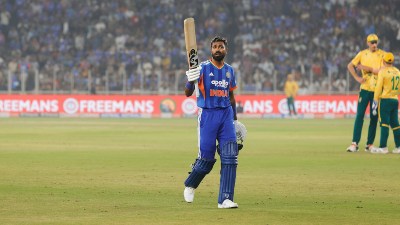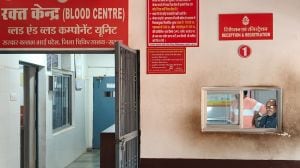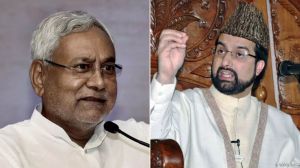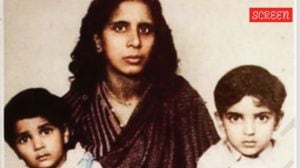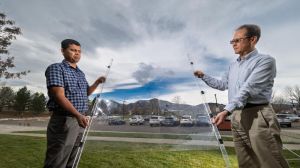‘Science Po plans to deepen ties with Indian universities through collaborations’: Dean of PSIA
The university, which currently offers courses in political science, history, economics, law and sociology is now planning to launch a dual degree in technology and international affairs with an aim to attract more Indian students to its campus.
 University’s third dean of the Paris School of International Affairs (PSIA), Arancha Gonzales
University’s third dean of the Paris School of International Affairs (PSIA), Arancha GonzalesScience Po is at the number three position in the Quacquarelli Symonds (QS) rankings in Politics and International Studies. It does not wish to set up a campus in India but plans to deepen ties with Indian universities through collaborations. In line with French President Emmanuel Macron’s announcement to welcome 30,000 Indian students to the country by 2030, the French public university is also keen on getting more Indian students to their campus in the upcoming year.
In that direction, the university, which currently offers courses in Political Science, History, Economics, Law and Sociology is now planning to launch a dual degree in technology and international affairs. The university currently has various agreements with 13 universities and colleges including, the Indian Institute of Technology (IIT) Bombay, IIT Madras, JNU, Jamia Millia Islamia, St Xavier’s College, Mumbai among others.
The university’s third dean of the Paris School of International Affairs (PSIA), Arancha Gonzales in her recent visit to India, attended the Raisina Dialogue in Delhi and made visits to Delhi University’s St Stephen College to strengthen its student exchange programme with the college. Gonzales also met with the university’s alumni in India.
In a conversation with The Indian Express, Gonzales spoke about the university’s apprehension about setting up a branch campus, a new dual-degree programme and the role of a university in the era of conflicts.
Q. How was your experience at the Raisina Dialogues and what are your plans apart from the world conference?
A. It is always great to be back in Delhi. I am visiting after the pandemic. The panel discussion centred around how to connect the Indian Ocean, Mediterranean Sea and the Atlantic Ocean better. The discussions also focused on the IMEC (India-Middle East-Europe Corridor) and how much attention should be given to it. This corridor has great potential because it is a new route that connects India, the Middle East and Europe. I think concrete and practical steps should be taken sooner rather than later to signal that it is not just a dream but can be a reality.
My purpose for the visit is also to look at contacts that Science Po has with India. We have partnerships with 13 different universities across India. In France, we are the number one university to welcome students from India in political science programmes. By coming here we want to project our priority that we give to India. The visit also involved meeting with our stakeholders like St Stephen’s College. I believe people-to-people exchanges are at the heart of the last meeting that was held between PM Modi and President Macaron.
Q. What kind of collaboration are you looking into with Indian educational institutions?
A. At St Stephen’s College, we are looking at two very concrete areas of collaboration. First is the exchange of students at the undergraduate level. We at Science Po, have a unique philosophy that our undergraduate students spend one year outside the university abroad. Likewise, we welcome students from 400 universities across the world to do undergrad studies with us. St Stephen’s College has been a good partner in terms of the exchange of students. We have postgraduate schools, including the one I lead — PISA. Many St Stephens students showed interest in doing a PG in international affairs from Science Po. The quality of students and their interests is promising.
We already have some agreements with 13 different educational institutes. In the future, we would like to anchor this collaboration and partnership with Indian universities by signing an agreement.
Q. What was the motivation behind the French Government’s intention to invite 30,000 students to France?
A. There has been a political agreement between the two governments to take the student exchange partnership to the next level. Today, the more you know about the world, the better you can deal at home and I think Indian students have that interest. France has a reputation for encouraging thinking. A lot of great philosophers came from France. Great scientists, writers, and filmmakers call France their home. It has always been big on culture and this is something that attracts the students. Closer to home, this institute is the right place for Indian students because they can study in English. You get the best of both worlds. We are ranked number three in the world in international relations and politics.
Q. As per the French consulate, most Indian students prefer to study business or engineering programmes in France. What steps are you taking to attract students to your university?
A. Yes business studies and engineering are some of the popular programmes in France but the next frontier is interdisciplinary education. It is good to be a skilled engineer who knows how artificial intelligence works but it is equally important to understand how AI impacts humans. The first part you can learn in an engineering school and the latter in a humanities school. This is why we see a growing interest in studying political science, history, sociology, anthropology, economics to understand different dimensions of science and technology. This is one of the main reasons why we are launching a new degree at the international affairs school in September.
We are launching a double degree postgraduate programme in technology and international affairs. Technology is a structuring factor of international affairs whether it is economics, rights, security and defence, or governance. These two worlds need to be brought together.
Q. India is now open to foreign institutions to set up a branch campus here. Do you see this as an opportunity worth pursuing?
A. We have thought very hard about it, however, we don’t think it works for us. A branch of a university in a different country is not like living in another country. It is difficult to replicate the environment you offer in your home country anywhere because it’s not just about a class, a professor, or just a curriculum. This university is a huge ecosystem, and you can’t replicate it anywhere. When you are in Paris, you also benefit from Paris’s exposure from UNESCO, educational, cultural, to the OECD, to the banking regulator for Europe among so many other things. So, educating is not just simply putting a teacher with a curriculum in a class. Education is also an experience.
I have seen a lot of universities opening campuses in Qatar and in the Emirates. But then they have difficulties attracting professors who would want to go to a campus abroad. Also, for a lot of our students, France is like a springboard to grab international opportunities at Geneva, New York, and Washington among others.
Q. You are leading one of the most popular higher educational institutes of politics and international studies. The world is currently witnessing one of the most polarising wars. How has this manifested on campus, in classrooms and overall discussions?
A. We are living in a period of confrontation internationally. There is a situation in the middle-east but there is also a civil war in Sudan, there is Myanmar, there is a Russian invasion of Ukraine, there is Horn of Africa, and of course Yemen. As an institution where 130 nationalities are represented, our duty is to shine a light on every conflict where they can grasp the complexity of it. We have clear rules of the game; plurality of views and respect for the views of the others.
You deal with this by not reinforcing the divisions but rather reinforcing what is common — which is humanity. It is normal that people are angry about their country being attacked, their neighbours being killed and injustice. The question is how do we channelise this anger? My preferred avenue is that you try to show empathy and care. There is also the need to go beyond being angry and look into what led us to this situation. In France, we have the largest Jewish community in Europe and the largest Muslim population.
The university, by definition, is the microcosm of the huge tensions between different communities. We have Palestinian students who have families back in Gaza. We also have Israeli students who were protesting what Benjamin Netanyahu was doing with the judiciary, some were in favour of it. The divisions are not just across but also within. It is important to give them space to express themselves and verbalise their anger. A university’s role is to provide safer spaces where they can debate some of the pressing issues that they have in their heads.
Q. You have also hosted Rahul Gandhi, one of the most prominent leaders of the Opposition in Indian Parliament at the institute last year. Was there a particular interest among students in interacting with Mr Gandhi?
A. We are a university that brings people from different walks of life to the campus for dialogue. I sent an invitation to a minister as well because I think his voice will be valuable. It is a space where people need to hear different voices. It is the only way a student can make up their mind if they have been exposed to different arguments. It can be a prime minister, it can be a leader of the opposition, it can be a filmmaker, a musician or a theatre artist who has something interesting to say. The guest speaks and then the audience asks questions unfiltered.
There was a lot of interest because the hall was full of not only Indian students but also from other regions. India is a large democracy and what happens here interests many. Similarly, we are doing this with American leadership and America will have elections soon.
- 01
- 02
- 03
- 04
- 05


